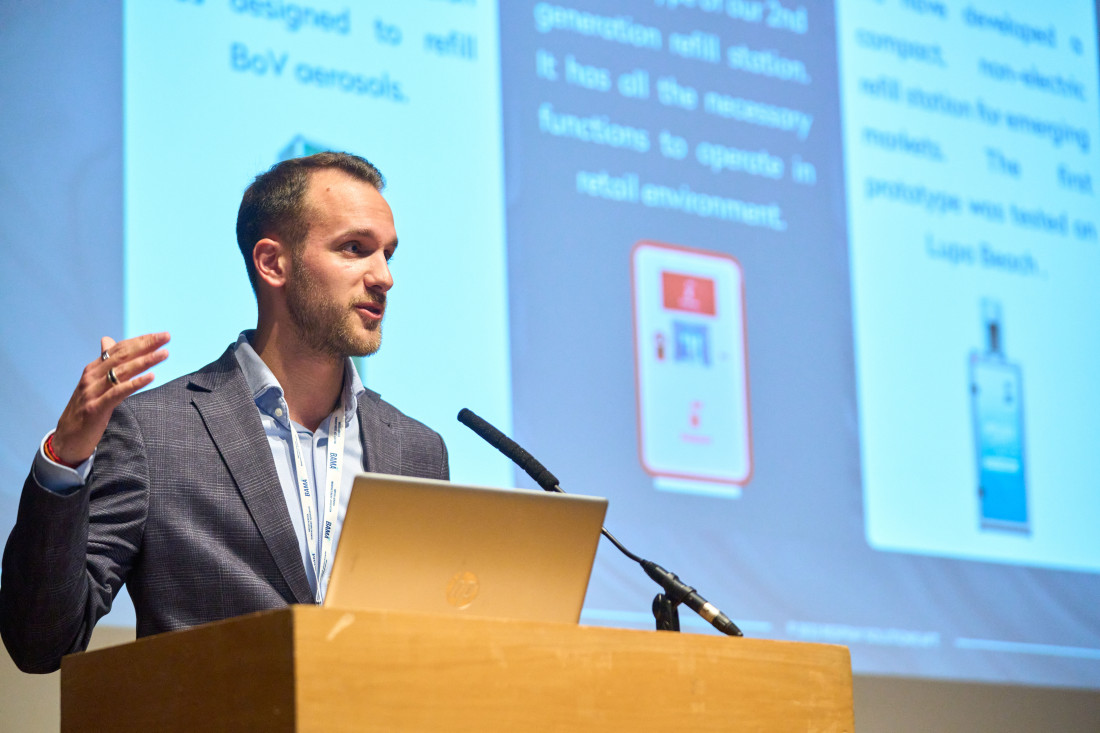*Sponsored by Lindal Valves*
Possibly because it is just one day long, or because the format allows for short bursts of mentally focussed sessions, separated by long breaks for caffeinated interaction, whatever the reason BAMA’s Innovation Day always feels alive with energy and excitement.
One hundred and fifty people had pre-registered their attendance, and the thirteen speakers delivered bright, clear and engaging presentations, mostly tackling the challenge of sustainability and circular economy.
Patrick Heskins opened the day with an introduction to BAMA’s NMVOC Pathway: a roadmap to enable the aerosol industry to shrink its contribution to the atmospheric emissions of Volatile Organic Compounds back to the level it was in 2005. The non-prescriptive strategy is especially designed to tackle the variety of technical and regulatory constraints applicable to the various product categories manufactured for delivery in aerosol format.
Joe Tyrrell, representing this year’s sponsor Lindal Valve, stood at the lectern to welcome the audience with a short and lovely speech, and to remind everyone that the Lindal staff would be available throughout the day to provide their expertise in the field of dispensing solutions.
The first official session kicked off with a brilliant presentation on how spray can be generated in nature. From chemical reactions within the chambers of an insect abdomen, capable of generating boiling caustic liquid shot out at enemies, to the surface tension of water drops used by mushrooms to project a cloud of its spores into the breeze, Jonathan Gawtrey took us well outside the box of mainstream aerosol technology.
On stage after L’Oreal, we had Alupro’s Executive Director, Tom Gidding. Tom’s outlined the current issue with aerosol products recycling rates, which are still below their true potential, and presented a clear roadmap to boost the figures. His analysis of the adverse factors was well structured and the plan for a solution takes into account the impact of forthcoming DRSs on metal packaging collection and disposal. Better awareness from consumers and collaboration from waste management companies are critical to stop the stream of valuable aerosol containers in the general waste. Therefore Alupro’s 2023 project includes communication with the two parties and consequent sampling of household waste to assess the results.
The last speaker of this session was Nik Nuijen, from Weener Plastics, a multinational manufacturing a huge range of plastic packaging. For the aerosol sector they provide actuators and spray caps in standard versions as well as in environmental PCR plastic, mono-material, without POM insert and detachable through a lift-and-rip design. All of these elements can be chosen individually or combined, and are applicable to caps of all sizes. It’s worth noting that their PCR actuators are also available in pastel colours, and that the spray angle for their insertless spray-cap is adjustable.
The audience was given leave to catch up with speakers and industry contacts over coffee in the adjoining Hall, where a variety of tables were available for the speakers and other companies to answer questions and handle samples.

Back in the auditorium, Session 2 started with the introduction of an alternative to the pressurised aerosol can. Flairosol, by AFA dispensing, is a trigger spray that delivers a very fine mist and works for a range of non-dry products, such as body sprays, air fresheners and several other water or alcohol-based products. While the formulation of the product could still be flammable, the fact that the container is non-pressurised makes transporting it simpler. A key benefit is that the container is a screw-top refillable one, this reduces the amount of packaging waste when compared to the single use aerosol dispenser.
Dr Keith Simons, Head of Research and Development, SHV Energy gave us an overview of the progress on producing LPG from non-fossil feedstock, in particular from ethanol. While the availability on the market is still few years away, industries larger than ours are driving the development of bio-LPG at a scale. For aerosol products where LPG can’t easily be substituted without compromising the spray performance, moving away from fossil sources is a step in the right direction.
The issue of post-consumer recycling introduced by Alupro was picked up again by Ric Exley, from Polytag, an organisation that has already applied serialised QR codes on milk packaging. Each individual QR code can be scanned for deposit return only once, and only after it has gone through the store check-out, to avoid fraud. The QR code is applied at the end of the labelling process and allows to track the percentage of product from retailer to waste management stage.
After a quick lunch break, Franco Osculati illustrated how the Fillinfinite counter-top machine fills the standard aerosol cans to a set customisable pressure, by injecting the product through the valve. The pressure is generated by the GreenSpense patented technology, which uses an elastic rubber bag-on-valve to force the liquid out, without the need for liquified of compressed gases. Together with Flairosol, the focus here is on removing the propellant gas and re-utilise the container, to offer lower atmospheric emission and reduce packaging waste.
Paul Sullivan, Managing Director of DH Industries offered a way to reduce emission during the production of the aerosols. Given that currently LPG is the most commonly used propellant for aerosols around the world, with few billions cans filled annually, the little ‘puff’ of gas released when the filling head lifts from the valve adds up to considerable amounts. The machinery components designed by Pamasol allow to recover the percentage of propellant otherwise dispersed in the atmosphere, increasing the efficiency and minimising the environmental impact at the filling stage.
A perfect time to introduce automation in manufacturing: Oliver Selby, from FANUC UK, highlighted the low penetration of automation in UK manufacturing compared to other countries and stressed how the introduction of robots for repetitive, dull tasks, would free up workers for more skilled and rewarding duties. He proceeded to show, as example, the speed at which an automated line can measure and sort salmon fillets by size and weight, lifting them from a conveyor belt and dropping them in the most appropriate crate, in the blink of an eye.
The fourth and last session of the day saw Dr Enrique Garcia, of the National Composite Centre, taking the attendees through the benefits and downside of composite materials. The strong, resistant material will be essential in delivering 8 points of the 10 that make up the UK plan to Net-Zero. Unfortunately, right now there is no sustainable way to dispose of composites materials at the end of their lifecycle. It seems that BAMA’s idea of adopting composite as substitute for metal in aerosol cans will have to be parked for the time being.
Next to the stage was Gergely Zámbó, Co-founder, ReSpray Solutions. Possibly the most exciting amongst the innovations presented this year, was the in-store aerosol re-fill machine designed by Gergely and his partner Andor. BAMA and CFA led for three years the representatives of the major European aerosol manufacturers in interactive workshops on the feasibility of refilling aerosol cans. A duo of Hungarian students actually went ahead, independently, and realised a machine that met all of the safety criteria required. The drugstore chain Rossmann has had the first machine operating in store for few months, using the retailer’s own brand of deodorant already familiar to the consumer, and allowing refill for a maximum of 5 times. Due to restrictions linked to the retail environment, flammable gases were not allowed, so compressed air coupled with a Salvalco valve was the chosen option. The test run was very successful, with both consumers and the media fascinated by the new concept.
Returning to propellant gases and their dependency on fossil-fuel, Alan Murphy from AvantiGas updated the audience on the production of renewable dimethyl ether (rDME) in the UK. Dimeta, a joint venture between AvantiGas parent company UGI, and SHV, will operate the production plant in Teesside, planned to be operative at commercial scale in 2024. DME can be used as fuel for off-grid heating and is also a great aerosol propellant because it is soluble in water, allowing reduction of the overall VOC content of a standard can.
Last but not least, the pioneer of the aerosol valve, Precision, outlined their latest contribution to dispensing design. Roberta Sironi detailed the advantages brought by Precision’s STORM technology to the environment, with a recyclable mono material spray cap, and to the assembly process. In fact, the application of this new technology leads to a reduction in weight and one less step in the assembly line, with consequent savings for the brand owner. The difference in spray performance is negligible and the optimisation of resources valuable.


